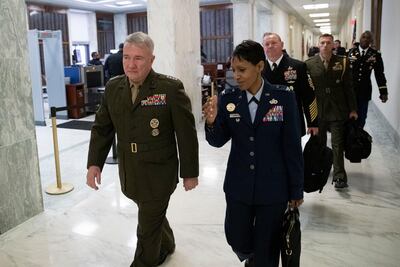A US general has said he has concerns about the Taliban’s relationship with Al Qaeda as the US began withdrawing troops from Afghanistan on Tuesday.
In a US house armed services committee session, Commander of US Central Command Gen Kenneth McKenzie said if the Taliban were to further their relationship with Al Qaeda after US troops pull out, the US would be ready to reintervene.
“We know how we got in [Afghanistan] in 2001, so we have an object lesson on how to enter” he said.
The meeting focused heavily on the relationship between the Taliban and other extremist groups in the region, with members of the committee grilling Gen McKenzie on how he can ensure the Taliban will not further their relationship with groups like Al Qaeda and ISIS once the US forces leave.
US military spokesman in Afghanistan Sonny Leggett said in a statement the military had begun its “conditions-based reduction of forces to 8,600 over 135 days.”
The US has said its partial troop withdrawal over an 18-month period provided for in the deal will be linked to the Taliban keeping their promises to help fight terror in Afghanistan, but not to the success of talks between the Taliban and the Afghan government.
Gen McKenzie said the coming weeks would be vital to test the Taliban’s willingness to abide by the accord.
“We don’t need to trust them, we don’t need to like them, we don’t need to believe anything they say. We need to observe” he said, saying he had faith in the Afghan government to assert themselves.
At the weekend, Taliban spokesman Zabihullah Mujahed said the insurgent group was committed to its agreement with the US and called on Washington to do its part to make sure its prisoners were freed.
ISIS claimed responsibility for a rocket attack that took place during Ghani’s inauguration ceremony. It also claimed a brutal attack last week on a gathering of minority Shiites that killed 32 and injured scores more. The US said it expected the group, which has been battling Afghanistan’s ISIS affiliate, to further aid in the effort to defeat the group.
Gen McKenzie said US forces were not worried about the presence of ISIS in Afghanistan as the group effectively had little presence in Nanghahar province, but noted there were attempts by the extremist group to rebuild.
Currently the US has about 13,000 soldiers in Afghanistan — 8,000 of whom are involved in training and advising Afghanistan’s National Security Forces, while about 5,000 are involved in antiterror operations and militarily supporting the Afghan army when they are requested.
Part of the deal signed by the United States and the extremist group last month included a commitment from the Afghan government to release Taliban fighters. The Taliban promised to honour the deal by handing over 1,000 government troops.
The release was expected to be announced on Tuesday after a week of delay.
The Taliban demanded the release of the prisoners as a confidence-building measure to pave the way for the opening of direct talks between the government and the insurgents after talks with the both sides and the United States individually.
Sediq Sediqqi, a spokesman for President Ashraf Ghani, said on Twitter that the presidential palace would issue a decree with details of the process, and the release was contingent on security and peace developments.
"The Afghan government has reached a framework based on which the release of prisoners will be in exchange for a significant reduction in the level of violence," he said.
A senior Taliban leader in Doha, the group's political headquarters, said vehicles had been sent to an area near Bagram Prison, north of the capital Kabul, to fetch the freed fighters.
"After our conversation with Zalmay Khalilzad (the U.S. special envoy for Afghanistan) on Monday, in which he conveyed to us the release of our 5,000 prisoners, we sent vehicles to pick them up," he said.
A government source said any release was unlikely in the coming days and could be weeks away.
The issue has become one of the biggest sticking points in any progress towards peace, complicated further by differing wording of documents between the United States and the Taliban and the United States and the Afghan government.
"The Taliban needs this to show to their rank and file. For the foot soldiers on the ground, a reduction-in-violence agreement, a troop withdrawal agreement signed in Doha means nothing, fighters returning is something they can feel," said an Asian diplomat in Kabul.
Mr Khalilzad attended Ghani's swearing-in ceremony in Kabul on Monday. The president had previously rejected the Taliban demand for its fighters to be released.


